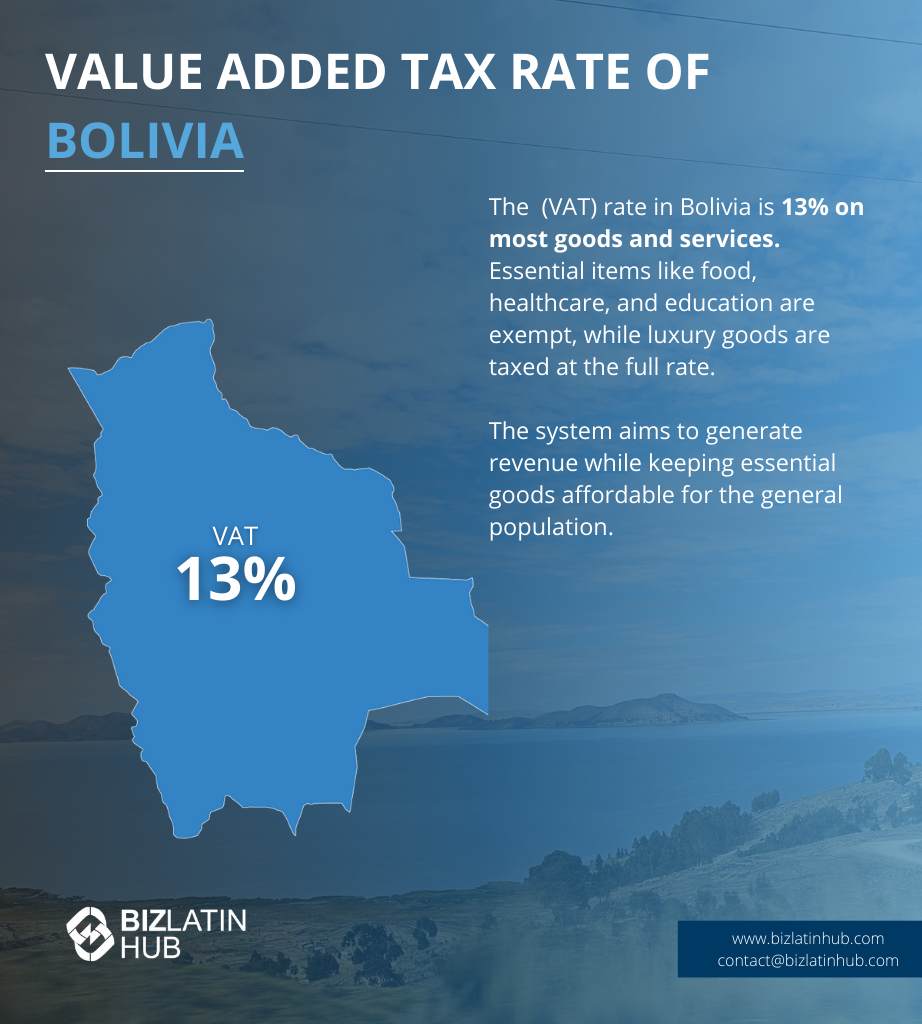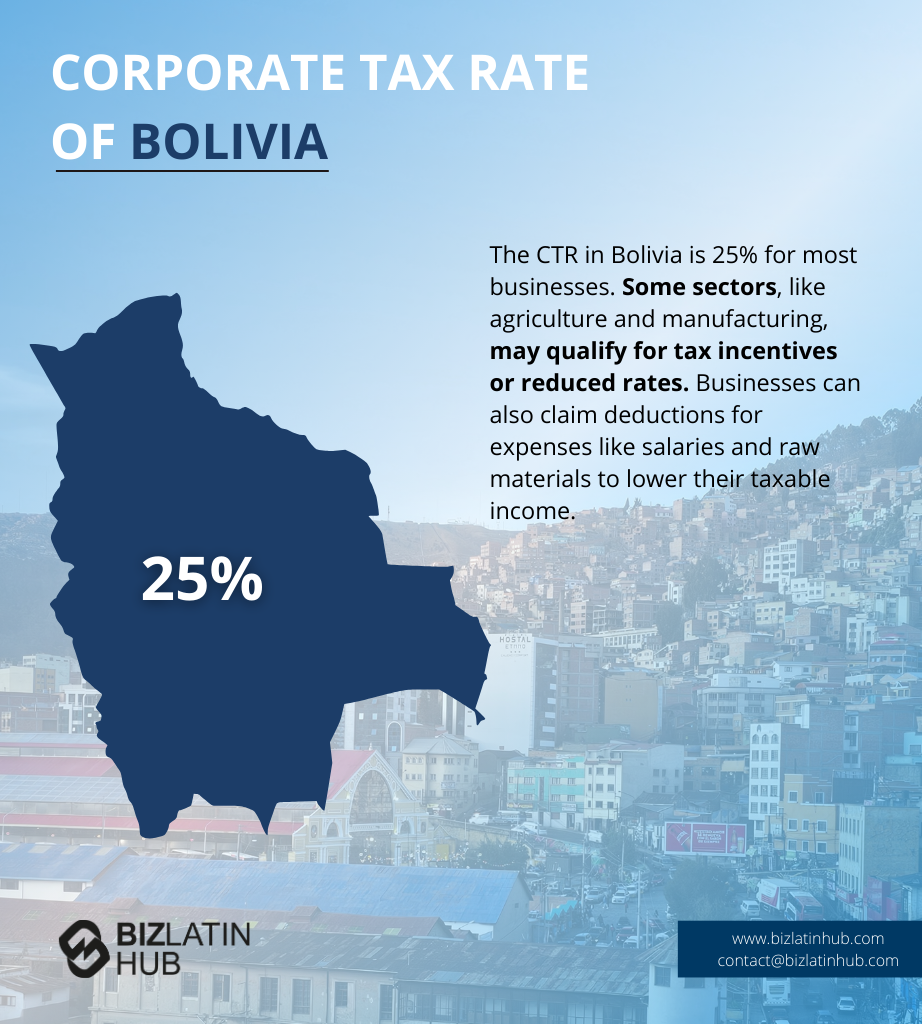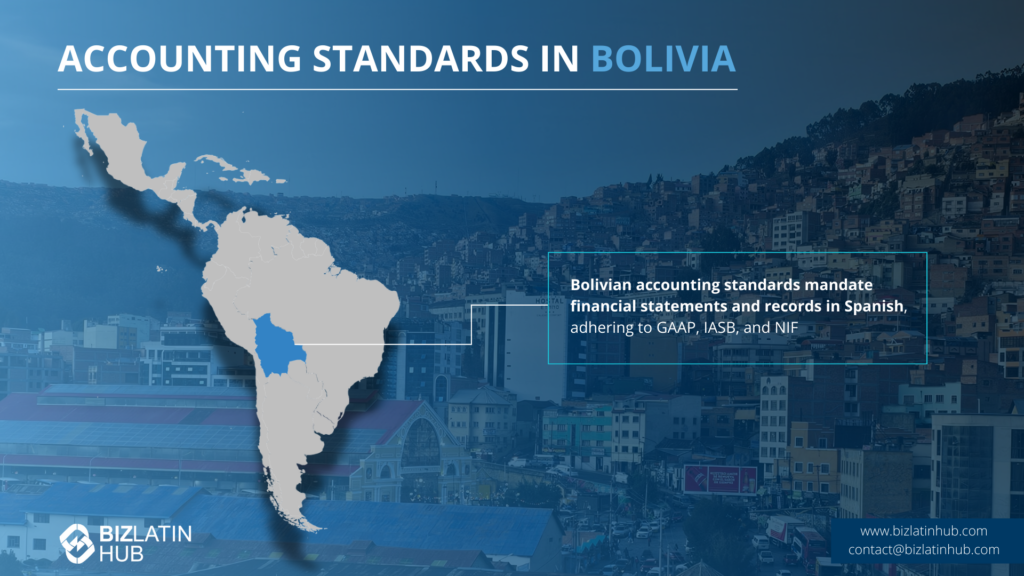Accounting in Bolivia is an essential component of your market entry strategy to establish a business and ensure adherence to its intricate regulatory framework. This guide offers critical insights to help you manage your fiscal responsibilities after your company formation in Bolivia. Biz Latin Hub delivers expert assistance in navigating Bolivia’s accounting standards. Our services cover the region through a wide-reaching network of offices across Latin America and the Caribbean.
Key Takeaways On Accounting in Bolivia
| What Are The Accounting Standards in Bolivia? | Bolivian accounting standards mandate financial statements and records in Spanish, adhering to GAAP, IASB, and NIF. |
| What Is The Corporate Tax Rate in Bolivia? | The current corporate tax rate in Bolivia is set at 25%. Additonal tax rates exist for mining/extractive companies. |
| What Is The Bolivian Value Added Tax Rate? | The VAT rate (IVA) in Bolivia is currently 13%. |
| Dividend Tax Rate in Bolivia | Dividend payments, profit distributions to head offices by Bolivian branches, interest, royalties, and service fees paid to non-residents are subject to a 12.5% withholding tax. |
What are the tax rates in Bolivia?
Your company will primarily be subject to corporate income tax, value added tax (VAT) and social security contributions in Bolivia. Below is a list of aspects to consider when it comes to taxes in Bolivia:
- The value added tax rate is 13%, which is a low percentage compared to other countries in the region. It does not apply to all export products and services.
- The capital gains tax rate is 25%, but it is exempt from the payment of transaction tax in the Bolivian stock market.
- The tax rate for establishing a branch of a company in Bolivia is 12.5%.

The tax year varies depending on the activity of the company:
- Banking, commercial, and service activities have a fiscal year of 31 December
- Industrial, oil and gas companies have a fiscal year ending 31 March;
- Agro-industrial and forestry companies have a fiscal year ending 30 June
- Mining companies’ fiscal year ends 30 September.
Each company must appoint an auditor to submit annual audited financial statements.
Companies must pay an average corporate tax rate of 25%, depending on the size of the turnover.
In addition, departmental and municipal governments (local territory level) impose tax on windfalls, real estate and vehicles. The rate for these taxes is set forth in departmental and municipal ordinances adopted by each local municipality on an annual basis.
What are the Accounting Regulations in Bolivia?
Understanding accounting requirements in Bolivia are crucial for your company’s activities and financial records. Below we specify some accounting regulations.

The mandatory accounting books or records in the country are: Libro Diario, Mayor y de Inventario y Balances, and other books that sectorial laws require, must be kept in Spanish and in the national currency. National legislation also allows accounting records to be kept by electronic or computerised means.
The accounts shall be kept by legally qualified accountants, to whom the regulatory rules on responsibilities, performance, remuneration and the keeping of the accounts apply.
Invoicing: The National Tax Service (SIN) periodically establishes , the requirement to use online invoicing methods. This is based on technical criteria that include economic activity, number of economic activities, invoice volumen, tax behavior, total invoice amount and e-commerce and related services.
The Commercial Registry (Registro de Comercio) is the entity in charge of monitoring and supervising the commercial activities of companies.
The SIN is the entity responsible for managing and overseeing national tax collection, tax registry and implementation of tax policies in Bolivia. Departmental governments and municipalities are in charge of departmental and municipal taxes.
The Following Activities are Prohibited in Accounting Books
- Altering the progressive order of dates of operations
- Leaving blank spaces
- Making interlinings or superimposed markings
- Making scratches, erasures or amendments to all or part of the entries
- Removing leaves, altering the order or mutilating the leaves of the books.
Books containing such irregularities have no probative value in favour of the trader who keeps them.
FAQs on accounting requirements in Bolivia
Based on our extensive experience these are the common questions and doubts from our clients when looking to understand accounting requirements in Bolivia.
The corporate tax rate in Bolivia is 25%.
Businesses in Bolivia are subject to various taxes, including corporate income tax, IVA (VAT), Transactional Tax and Municipal Taxes. The tax regime can vary depending on companies’ activities and their location.
An additional rate of corporate income tax of 12.5% is applied on mining operations resulting from favorable prices in minerals and metals (on exploitation activities)
In Bolivia, the equivalent to the IRS (Internal Revenue Service) is known as the “Servicio de Impuestos Nacionales” (SIN).
Bolivian accounting standards require companies to prepare their financial statements in Spanish and Bolivia must follow GAAP, IASB, and NIF. Accounting registries and books of account must be recorded in Spanish.
In Bolivia, individuals who are certified accountants and have met specific professional requirements are typically known as “Contadores Públicos.” They play a role similar to that of Certified Public Accountants (CPAs) in other countries.
The IFRS (International Financial Reporting Standards) have not been implemented to date in Bolivia because they have not been officially approved by Bolivian authorities. However, some larger companies or those with international operations may choose to adopt IFRS voluntarily for their financial reporting to align with global standards.

Why Invest in Bolivia?
Bolivia is a country of vast potential, offering a wealth of natural resources and growing opportunities in emerging industries. As one of South America’s largest producers of natural gas, lithium, and precious metals, Bolivia is a key player in the global energy and mining sectors. The government has introduced initiatives to attract foreign investment, including tax incentives and strategic infrastructure projects that enhance connectivity with neighboring markets. With abundant agricultural land, Bolivia also offers significant prospects in agribusiness and food exports.
Beyond its resources, Bolivia’s advantages include a youthful and expanding workforce, competitive labor costs, and untapped opportunities in tourism, driven by its unique cultural heritage and breathtaking landscapes, such as the Uyuni Salt Flats and the Andes. The country’s vast reserves of lithium position it as a crucial player in the renewable energy transition, particularly for electric vehicle batteries. For investors seeking to engage with a resource-rich and evolving economy, Bolivia presents a compelling opportunity.
Biz Latin Hub can help with accounting requirements in Bolivia
Understanding taxation and accounting requirements in Bolivia will make it easier for you to budget. Additionally, it will help you understand what you will have to deal with when it’s time to declare your taxes.
If you would like more information about accounting regulations or tax laws in Bolivia, Biz Latin Hub’s group of experts offer you legal and accounting assistance for your business in Bolivia. Take advantage of our large range of multilingual market entry and back-office business solutions to meet your company’s incorporation and compliance needs.
Contact us now for help in establishing a successful business in Bolivia.
Learn more about our team and expert authors.






